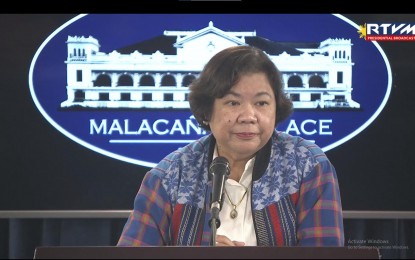
Department of Migrant Workers Secretary Susan Ople (File photo)
MANILA -- The Philippine government is committed to uphold international statutes protecting the rights of migrant workers and extend special attention to female workers and their children.
In her closing remarks on Friday at the 21st Session of the United Nations (UN) Committee on the Protection of the Rights of All Migrant Workers and Members of their Family in Geneva, Switzerland, Department of Migrant Workers (DMW) Secretary Susan Ople reaffirmed the country’s commitment and cited the government’s whole-of-government approach to address the concerns of migrant workers and their families.
“We underscored throughout the past two days the Philippine government’s belief that migrant workers’ rights are human rights and that our State has both the obligation and privilege of caring for them, and for their families,” Ople said.
“At the time of their greatest need, we are there.”
The DMW chief assured the committee and its member-states that the Philippine government will continue to engage the civil society, uphold the rights of inbound migrants, and be conscious of the need to protect and shield families, especially children left behind, from the social costs of labor migration.
She said the Philippine government’s focus on building a stronger and more robust economy will help address concerns over the growing number of women seeking employment abroad.
“You have also raised concerns on the feminization of migration, a concern that we share, and the reason why our whole-of-government approach to building a stronger and more robust economy is focused on addressing this issue at its core,” she said.
Ople likewise pledged greater effort to inform the department’s stakeholders about the International Convention on the Protection of the Rights of All Migrant Workers and Members of Their Families (CMW) and its provisions.
The Philippine government will actively work to convince other UN member-states to ratify the CMW, she added.
Ople led a high-level delegation to the UN on Thursday and Friday to present the status of the Philippine government’s compliance with the CMW.
Member-states that are signatories to the Convention are asked to appear every five years before the UN committee, composed of labor migration experts from various countries.
The Philippine delegation is co-chaired by Ambassador Evan Garcia, head of the Philippine Mission in Geneva; and Undersecretary Severo Catura, Executive Director of the Presidential Human Rights Committee Secretariat.
The Philippine delegation includes senior officials from the Department of Foreign Affairs, Department of Justice, Department of Health, Department of Social Welfare and Development, Philippine Statistics Authority, and Presidential Human Rights Committee Secretariat.
According to Ople, the two-day dialogue “gave us an opportunity to convey with pride our best practices – our milestones amid our many challenges – in ensuring that the welfare and security of our overseas migrant workers and their families are promoted, protected and fulfilled.”
In her opening remarks delivered at the start of the session on Thursday, Ople shared how Philippine government departments and agencies “work together as one -- in times of crisis -- to come to the aid of our overseas Filipino workers.”
She said the Philippine government’s dedication to migrant workers and their families are guided by President Ferdinand R. Marcos Jr.’s statement during his State of the Nation Address (SONA) in July last year.
In his SONA, the President recognized the role of migrant workers in national development and assured them that their welfare and protection, including those of their families, are foremost in government’s priorities.
Ople cited examples of recent actions taken by the Philippine government, among them aid and relief assistance extended to migrant workers displaced by the Covid-19 (coronavirus disease 2019) pandemic, as well as natural calamities in their host countries.
She also said the Philippine government has allocated emergency funds for migrant workers in distress, extends health care and other services for migrants and their families, and pursues an aggressive campaign against illegal recruitment and human trafficking.
“At times of crisis affecting our migrant workers and their families, we respond with a whole-of-government approach,” Ople said.
Bilateral agreements were also signed with Kuwait, United Arab Emirates, and the Kingdom of Saudi Arabia extending greater protection for domestic workers.
“The Philippines will never cease to protect its OFWs, regardless of gender, status, and the skills they possess. We believe, not only as a government but as a democratic country, as a society, that migrant workers’ rights are human rights,” she said.
“Diminishing these rights, diminishes us all.” (PNA)
